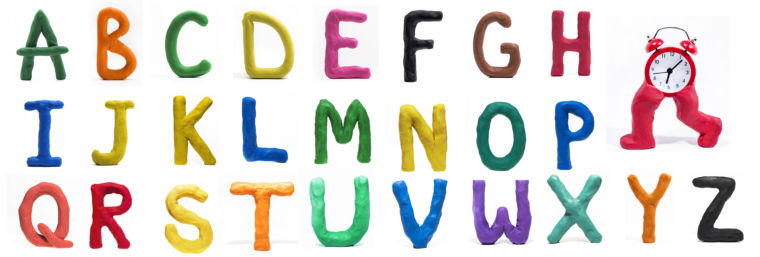Each letter of the alphabet is a steadfast loyal soldier in a great army of words, sentences, paragraphs, and stories. ~ Vera Nazarian

Starting today and for the next 25 days, I will discuss something pertaining to reading and learning difficulties beginning with a letter of the alphabet… going from A to Z.
Today’s word is ALPHABET.
For children with reading and learning difficulties, the alphabet can be a challenging and overwhelming concept to grasp. Learning the alphabet requires a combination of visual and auditory skills, as well as the ability to recognize and remember letters and their corresponding sounds.
Children with dyslexia, a learning difference that affects reading, writing, and spelling ability, may find it difficult to recognize and differentiate letters, as well as associate them with their corresponding sounds.
Children with Attention Deficit Hyperactive Disorder (ADHD) or other attention disorders may find it hard to focus and concentrate during alphabet instruction, making it harder for them to retain information.
Some children may have difficulty with visual processing, which can make it hard for them to distinguish between similar-looking letters such as b and d.
What is the importance of the alphabet in reading and learning?
Here are 3 reasons:
- Letter Recognition
- Letter recognition is a foundational skill for reading and is essential for developing fluent reading abilities. Letters represent the sounds that make up words, and learning to recognize and associate letters with their corresponding sounds is the first step in decoding words. Children who struggle with letter recognition may struggle with decoding and word recognition, leading to difficulty reading and comprehending texts.
- It is also important for children to be able to recognize letters in words, as this skill is critical for developing sight word recognition. Sight word recognition allows children to read words automatically, without needing to decode them letter by letter. This is important for reading fluency, as it allows children to read at a faster pace and focus on comprehension rather than decoding.
- In addition, letter recognition is crucial for spelling. When children can recognize and identify letters, they can use them to form words and spell them correctly. Strong spelling skills are important for effective communication, both written and oral. Therefore, learning letter recognition is a crucial step in developing strong reading, writing, and communication skills.
- Vocabulary Development
- Vocabulary development is a critical aspect of reading and language learning, and the alphabet plays an essential role in this process. Once children have learned to recognize and name each letter of the alphabet, they can begin to associate these letters with words, and their corresponding sounds and meanings. Children can then use this knowledge to decode words and comprehend what they are reading.
- Once children have a good grasp of the alphabet, they can start to learn new words by associating them with the letters they already know. For instance, a child who knows the letters “a” and “p” can learn the word “apple” by blending the sounds of the letters together. Similarly, children can learn new words by breaking them down into their component sounds and letters.
- In general, the alphabet plays a critical role in vocabulary development, as it provides the foundation for decoding and comprehending words. Once children have learned to recognize and associate letters with words and their meanings, they can continue to expand their vocabularies and develop their reading and language skills.
- Writing Skills
- Writing skills are an essential aspect of literacy, and the alphabet is a critical tool for developing these skills. Children need to learn how to recognize, form, and write each letter of the alphabet to be able to write words and sentences accurately and effectively.
- Once children have learned to recognize and form letters, they can begin to write words and sentences. They can use the alphabet to spell out words, and they can use the letters to form sentences and paragraphs. Developing strong handwriting skills is also essential for academic and practical purposes. Children who can write legibly and accurately are better able to communicate their ideas, complete written assignments, and perform well on written tests.
There are various tools, techniques, and strategies available to help children with learning differences to master the alphabet. It is important to provide children with the support and resources they need to develop strong literacy skills, and to approach learning the alphabet with patience and understanding.
Every child deserves the opportunity to learn the alphabet in the way their brain works.
If you have a child with reading or learning difficulties, I invite you to join the Parenting Hub… a place to connect and network with parents who share similar challenges. If you know someone with a child with learning differences, send them the link.

This is so comprehensive! Very useful information for parents, teachers, and tutors!
I remember, as a kid, how much I used to enjoy singing the alphabet song. Although it never led to any decoding skills for me, it did benefit me, as it led to a lifetime appreciation for music!
Some children can’t recite the alphabet without singing it. I’m glad singing the alphabet song led you to appreciate music, which is such a benefit to life and living.
Looking forward to this series from you Florence… the alphabet does play such a critical role in learning (any language..)
It certainly does, Vidya!
My son struggles with reading and I will be sharing your post with him in our Homeschool Classes and see what he thinks we can do to help him become a better reader while also helping my husband who can’t read or spell.
Glenda, I’m always happy to help. Feel free to reach out to me here if you need specific strategies that are personalized for your son.
Thanks for sharing your ABC poem here.